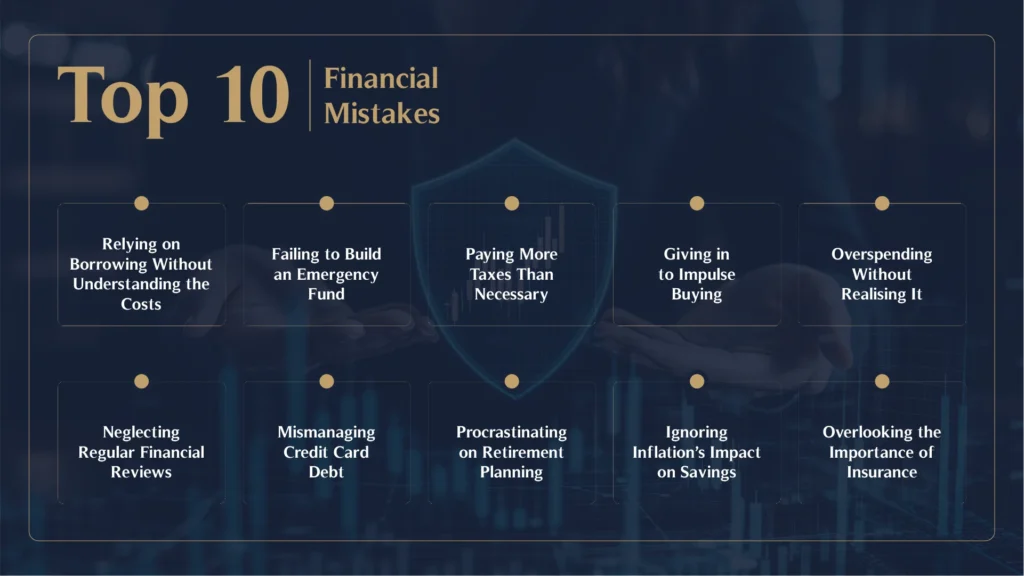Financial literacy is a cornerstone of achieving long-term stability and building a secure future. However, even the most financially aware individuals can make costly mistakes that hinder their progress.
From poorly managed debt to inadequate retirement planning, these missteps can have lasting consequences.
In this article, we’ll outline 10 common financial mistakes and provide actionable strategies to avoid them.
Key Takeaways
- Build a Strong Financial Foundation: Avoid common financial mistakes like neglecting an emergency fund, mismanaging debt, or overspending to ensure stability.
- Plan for the Future: Early retirement planning and regular financial reviews can significantly enhance your financial security.
- Combat Inflation: Protect your savings by investing in growth-oriented assets to maintain purchasing power over time.
- Manage Credit and Borrowing Wisely: Understand the long-term costs of borrowing and practice disciplined credit card use to avoid unnecessary debt.
- Secure Adequate Insurance Coverage: Ensure your financial well-being with sufficient health, life, and property insurance to protect against unexpected events.
Top 10 Financial Mistakes (and How to Avoid Them)
1. Relying on Borrowing Without Understanding the Costs
Borrowing money can be a double-edged sword—it has its uses, but without proper understanding, it can quickly lead to financial strain. Underestimating the long-term impact of interest rates and repayment terms can turn manageable loans into overwhelming debt burdens.
Types of Borrowing Options
There are various borrowing options available, such as personal loans, credit cards, mortgages, and payday loans. Each option comes with its own set of terms and conditions, interest rates, and repayment schedules.
Disadvantages of Borrowing Money
- Interest Costs: Borrowing can significantly increase the cost of purchases due to high interest rates, especially with credit cards and payday loans.
- Debt Cycle: Over-reliance on borrowing can lead to a cycle of debt that becomes harder to escape over time.
- Impact on Credit Score: Missing payments or borrowing excessively can harm your creditworthiness.
When Borrowing May Be Necessary
Borrowing might be necessary in situations like purchasing a home, funding higher education, or managing unexpected expenses. The key is to borrow responsibly, understanding the terms and ensuring repayments are manageable.
For instance, if you’re buying a home valued at £250,000, a mortgage allows you to spread the cost over 20–30 years with manageable monthly payments, rather than paying the full amount upfront.
2. Failing to Build an Emergency Fund
An emergency fund is a financial cushion designed to absorb unexpected expenses without derailing long-term plans.
This fund serves as a dedicated reserve for unforeseen events such as sudden job loss, home repairs, or medical emergencies. Without an emergency fund, individuals may resort to high-interest loans or deplete savings earmarked for other goals.
Recommended Savings Amount
Financial advisors typically recommend saving three to six months’ worth of essential expenses. For example, if your monthly expenses total £2,000, aim for a fund of £6,000–£12,000.
Strategies for Building an Emergency Fund
- Automate Savings: Set up a direct deposit into a separate savings account.
- Reduce Non-Essentials: Temporarily cut back on discretionary spending, such as dining out, subscription services, and non-essential shopping, to accelerate savings.
- Use Windfalls Wisely: Allocate bonuses, tax refunds, or inheritances to your emergency fund.
Consistency in contributing to your emergency fund, even in small amounts, can help build a robust financial safety net.
3. Paying More Taxes Than Necessary
Paying taxes is unavoidable, but with proper planning, you can reduce your tax liability within legal boundaries. Failing to utilise tax-efficient accounts, deductions, and allowances can leave you paying more than necessary, reducing the funds available for your savings and investments.
Common Tax Mistakes to Avoid
- Filing Late: This often results in penalties and unnecessary interest payments.
- Overlooking Deductions: Many individuals miss out on deductions for education expenses, charitable donations, or home office costs.
- Lack of Record Keeping: Poor documentation can lead to missed opportunities during tax season.
Legal Ways to Reduce Tax Liability
- Invest in Tax-Efficient Accounts: Use ISAs, pensions, or other tax-advantaged vehicles.
- Plan Charitable Contributions: Donations to registered charities can reduce your taxable income.
- Claim Eligible Allowances: If self-employed, claim allowable expenses like travel, equipment, and utilities.
Importance of Consulting a Financial Advisor
A financial advisor can provide a customised plan to optimise your tax payments, ensuring compliance while identifying overlooked savings opportunities. At MHG Wealth, our advisors offer tailored strategies to minimise tax liability and make tax planning an integral part of your wealth management. Reach out to us today to speak with an advisor.
4. Giving in to Impulse Buying
Impulse buying often stems from emotional or psychological triggers, leading to regret and financial strain. Over time, these unplanned purchases can accumulate, significantly impacting your ability to stick to a budget and achieve long-term financial goals.
Psychological Factors Behind Impulse Purchases
Retailers use tactics such as flash sales, limited-time offers, and strategic product placements to encourage impulsive decisions.
For instance, online retailers like Amazon and eBay often use countdown timers during flash sales or highlight “limited stock available” messages to create a sense of urgency, prompting customers to make purchases without fully considering their needs.
Recognising these strategies is the first step to regaining control.
Techniques to Curb Impulse Buying
- Set a Cooling-Off Period: Wait 24–48 hours before purchasing non-essential items.
- Use Cash Instead of Cards: Psychologically, spending physical money feels more significant than swiping a card.
- Avoid Tempting Environments: Limit exposure to online shopping sites or unsubscribe from promotional emails.
Creating a Budget to Control Spending
By allocating funds for discretionary expenses, you can enjoy occasional indulgences without jeopardising your savings goals. For instance, setting aside £50 a month for impulse purchases, such as a book, a piece of decor, or a small gadget, allows you to satisfy the occasional urge to buy something on a whim while ensuring your spending remains within limits.
5. Overspending Without Realising It
Overspending is a prevalent issue that can hinder progress toward financial goals. Addressing its root causes is key to maintaining control. Often, overspending occurs subtly—small, frequent purchases like daily coffees, subscription services, or online shopping can add up over time without notice. These seemingly harmless expenses can strain your budget and leave little room for savings or investments.
Identifying Triggers for Overspending
Triggers can include social pressures, emotional states, or lack of awareness about spending habits. Tracking expenses over time can reveal patterns and areas to improve.
Setting Realistic Spending Limits
Establishing boundaries for specific categories, such as dining out, entertainment, or subscription services, helps maintain discipline without feeling overly restricted. For instance, allocating £150 a month for dining out ensures you can enjoy a few meals at your favorite restaurants while keeping the rest of your income focused on savings and essential expenses.
Tools and Apps to Track Expenses
Apps like Expensify and PocketGuard offer real-time tracking, allowing you to monitor your financial health effectively.
6. Neglecting Regular Financial Reviews
Regular financial reviews are essential for adapting to life changes and staying on track with your financial goals.
Frequent reviews help identify risks, measure progress, and adjust strategies as needed. For example, a raise at work might require revisiting your budget or retirement contributions.
Key Areas to Assess During a Financial Review
- Savings Goals: Are you on track to meet short- and long-term objectives?
- Investment Performance: Evaluate returns and adjust your portfolio if needed.
- Debt Levels: Consider strategies to pay down high-interest debt faster.
Financial advisors can provide insights tailored to your situation, helping identify overlooked opportunities or risks in your financial plan. At MHG Wealth, we focus on crafting personalised strategies to help you stay on track and achieve your financial goals. Contact us today to learn more.
7. Mismanaging Credit Card Debt
Credit cards offer convenience but require disciplined use to avoid falling into debt traps. Carrying over balances and only making minimum payments can lead to mounting interest charges, quickly turning manageable debt into a financial burden.
Benefits and Risks of Credit Card Use
- Benefits: They offer rewards, fraud protection, and help build credit scores.
- Risks: Interest rates on unpaid balances can quickly accumulate, turning convenience into costly debt.
Tips for Managing Credit Card Debt
- Pay More Than the Minimum: This reduces interest charges and shortens repayment periods.
- Consolidate Debt: Consider transferring balances to a lower-interest card if available.
- Set Spending Alerts: Notifications can prevent overspending and keep you accountable.
Understanding Hidden Fees Associated with Credit Cards
Examine terms for charges like late fees or foreign transaction costs to avoid unexpected expenses. Many credit card providers also charge annual fees, cash advance fees, or balance transfer fees, which can significantly increase costs if overlooked. Additionally, some cards impose penalty APRs if payments are missed, leading to higher interest rates on future balances.
Pro Tip: Always read the fine print before signing up for a credit card and use tools or apps to monitor potential charges. For frequent travellers, consider cards with no foreign transaction fees to save money on international purchases.
8. Procrastinating on Retirement Planning
Retirement planning is often deferred, but starting early can make a significant difference due to the power of compound interest. Delaying contributions, even by a few years, can result in a substantial shortfall in your retirement savings over time, making it harder to reach your financial goals.
Common Mistakes in Retirement Savings
- Procrastination: Waiting too long to save reduces potential returns.
- Relying Solely on State Pensions: These may not provide sufficient income for a comfortable retirement.
- Failing to Diversify Investments: Relying on a single type of asset, such as cash or stocks, increases risk and limits growth potential.
Importance of Starting Early and Saving Consistently
Even modest contributions, when made consistently over time, can lead to significant growth. For instance, saving £200 monthly from age 25 could yield far more than saving £500 monthly starting at age 40.
Role of a Financial Advisor in Retirement Planning
Advisors can provide clarity on retirement goals, recommend investment strategies, and ensure that savings align with your future needs. At MHG Wealth, we specialise in helping you create a personalised retirement plan that secures your financial future. Contact us today to get started.
9. Ignoring Inflation’s Impact on Savings
One of the most overlooked aspects of financial planning is how inflation erodes the purchasing power of money over time. While saving is essential, simply keeping money in a low-interest account might not be enough to maintain its value in the long run.
How Inflation Affects Your Savings
Inflation reduces the real value of money, meaning that £1,000 today will buy less in the future if the inflation rate outpaces the growth of your savings. For example, with an inflation rate of 3%, an item costing £1,000 today will cost £1,030 next year, while savings in a typical low-interest account may only grow by £10 or less.
How to Combat Inflation
- Invest in Growth-Oriented Assets: Consider investing in stocks, real estate, or other assets that historically outpace inflation over the long term.
- Use Inflation-Linked Bonds: These bonds are designed to adjust their returns in line with inflation, protecting your savings from losing value.
- Diversify Savings: Spread funds across various investment types to balance risk and returns.
10. Overlooking the Importance of Insurance
Many people underestimate the role insurance plays in protecting their financial well-being. Without adequate coverage, unexpected events such as accidents, illness, or natural disasters can deplete savings and derail financial plans.
Common Insurance Gaps
- Health Insurance: Insufficient coverage can lead to significant out-of-pocket expenses during medical emergencies.
- Life Insurance: Many individuals either lack life insurance or are underinsured, leaving their loved ones financially vulnerable.
- Property Insurance: Neglecting to insure valuable assets like your home or car can result in costly replacements or repairs.
How to Ensure Adequate Insurance Coverage
- Evaluate Your Needs Regularly: As your circumstances change—marriage, children, or a new home—your insurance needs may increase.
- Consider Disability Insurance: Protect your income in case of an accident or illness that prevents you from working.
- Compare Policies: Shop around to ensure you’re getting comprehensive coverage at competitive rates.
Conclusion
Securing your financial future requires consistent, thoughtful planning and proactive management of your finances. By recognising and addressing these ten common financial mistakes—such as mismanaging debt, neglecting your emergency fund, or delaying retirement planning—you can significantly enhance your financial health. Regular financial reviews, responsible credit management, and adequate insurance coverage also play a key role in securing your financial future.
Seeking professional guidance can make this journey smoother and more effective. A financial advisor offers personalised strategies tailored to your unique circumstances and goals. At MHG Wealth, we are dedicated to providing clear, trustworthy advice that helps you build and protect your wealth. Discover our comprehensive wealth management strategies to support your financial journey.
Take charge of your financial future today – contact MHG Wealth to discover how our personalised financial planning can help you achieve your specific goals.






